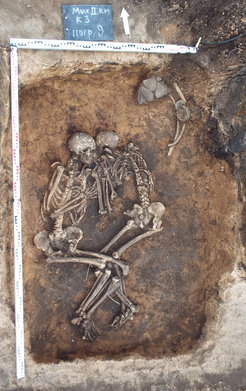Maria Spyrou of the MPI-SHH receives Otto Hahn Medal for 2018
The Otto Hahn Medal is awarded annually by the Max Planck Society to approximately 30 young researchers for best PhD thesis. The prizes are awarded at the general meeting of the MPG each June and are among the most prestigious honors for PhD students in Germany.

On 26 June 2019, Maria Spyrou will receive the Otto Hahn Medal for 2018 for outstanding achievement on her PhD thesis. Spyrou’s PhD dealt with the evolutionary history of the notorious bacterial pathogen Yersinia pestis, the causative agent of plague, during the last 5,000 years of human history. The main topics of her research included the investigation of the bacterium’s diversity during the infamous historical plague epidemics as well as the discovery of important insights regarding the early stages of its evolution as an epidemic pathogen, including the oldest genome of strains causing bubonic plague.
The main topic of Spyrou’s PhD research was the Second Plague Pandemic (14th – 18th centuries AD), which included the infamous Black Death (1346 – 1353 AD). Her thesis presents a systematic study of medieval Y. pestis genomes from epidemic sites in England, France, Germany, Russia, Spain and Switzerland spanning the time transect between the 14th and 17th centuries AD. The data from the study show that the disease possibly entered Europe through Western Russia and spread quickly. Importantly, Spyrou’s work also reveals the Black Death as a source for modern-day plague outbreaks around the world.
Y. pestis disappeared from Europe during the 18th century for reasons that are not well understood. Through her PhD work, Spyrou discovered the loss of virulence-associated genes in genomes connected with some of the last documented European plague outbreaks, i.e. those from a 17th century epidemic in London and those from the Plague of Marseille (1720-1722 AD). Though their functional significance cannot be directly assessed through genomics, such findings open possibilities for future research to assess those variants and their effect on bacterial fitness.

Research on prehistoric plague
Spyrou’s PhD work also included research on prehistoric plague. One study that she coauthored showed that the Y. pestis phylogenetic patterns parallel the documented Bronze Age human migrations, suggesting that the bacterium may have migrated with humans across Eurasia. In addition, analysis of the Y. pestis genomic composition showed marked differences from modern and historical strains. Though today Y. pestis is known to be transmitted by fleas, those early genomes did not have the variants associated with flea transmission. In addition, given that flea transmission is associated with the bubonic plague, this led to the hypothesis that Y. pestis was unable to cause this type of disease during prehistory. Through her research, Spyrou offered insights into the origin of flea-mediated transmission in Y. pestis. In another study that she led, Spyrou described novel genomes from about 4,000 years ago which would be compatible with flea transmission. This traces the origins of bubonic plague back to the Bronze Age, and suggests that different forms of the bacterium were circulating in Eurasia during prehistory.

Double burial of 3,800-year-old individuals that were positive for Y. pestis. The kurgan burial was unearthed in the Samara region in Russia and its characteristics are affiliated with the Srubnaya culture of the Late Bronze Age.
The Otto Hahn Medal
The Otto Hahn Medal for outstanding scientific achievements is awarded by the Max Planck Society to up to 30 young scientists and researchers each year since 1978. Since that time, more than 970 scientists and researchers have been awarded the Otto Hahn Medal, which includes a 7500 euro monetary prize. The award is presented during the general meeting in the year following the completion of the individual’s PhD, which this year will be 26 June 2019.


